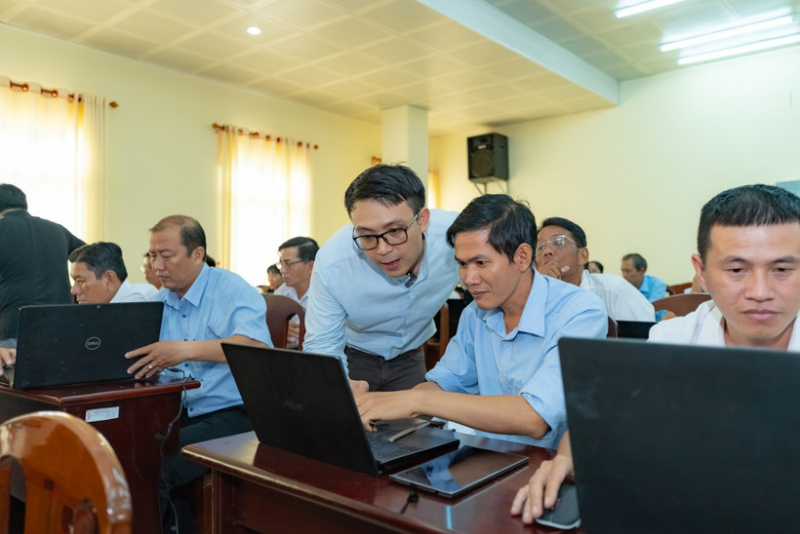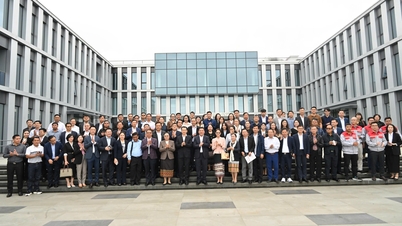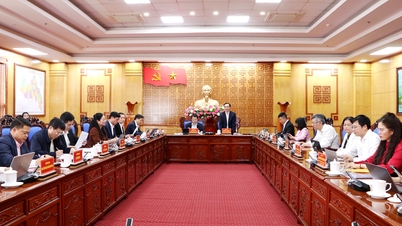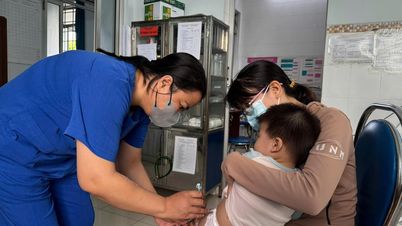92% of Vietnamese teachers believe that the teaching profession is respected by society.
According to the Ministry of Education and Training , the TALIS 2024 survey was implemented by the OECD to provide international comparative evidence on the team of secondary school teachers and principals, thereby reflecting the characteristics, perspectives and professional experiences of the teaching staff in the context of general education reform and digital transformation. Following the 2018 cycle, Vietnam continues to participate with a nationally representative sample of 202 educational institutions in 58 provinces and cities, 202 principals and 4,410 teachers. The entire process is carried out on computers according to OECD's strict technical and security standards, ensuring objective and reliable results.
The TALIS 2024 results show that Vietnamese teachers have an average age of 42 years, lower than the OECD average of 45 years; 70% are female and 91% have long-term contracts. The Vietnamese teaching staff is assessed as young, enthusiastic, with increasingly good technological capacity and high levels of career satisfaction. Notably, 92% of Vietnamese teachers believe that the teaching profession is respected by society, the highest rate among all countries participating in the survey (while the OECD average is only 22%).
At the same time, 87% of teachers believe that their opinions are listened to and valued by policymakers, an increase of 8% compared to the 2018 cycle. Job satisfaction is very high: 97% of teachers are satisfied with their jobs (compared to OECD: 89%), and only 3% of teachers under 30 intend to leave their jobs in the next 5 years (OECD: 20%). 58% of teachers are satisfied with their current salary, 19 percentage points higher than the OECD average and up 6% compared to 2018.

One of the notable highlights of TALIS 2024 is the digital transformation capacity of Vietnamese teachers. Up to 64% of teachers have used artificial intelligence (AI) in teaching, ranking 5th among participating countries and territories, higher than the OECD average (36%). However, 71% of teachers said that schools lack the necessary infrastructure and digital tools to apply AI, significantly higher than the OECD average (37%). Among teachers who have not used AI in teaching, 60% said that they do not have enough knowledge and skills to apply this technology (OECD: 75%). This reflects the urgent need for training and fostering digital capacity for teachers in the context of strong digital transformation.
54% of teachers feel pressured about student performance and curriculum changes
According to the survey results, 95% of Vietnamese teachers found that professional development activities had a positive impact on teaching (OECD: 55%). 96% of teacher educators rated their initial training program as high quality (OECD: 75%). The level of professional collaboration has also increased significantly: 69% of teachers participate in group teaching (a sharp increase compared to 2018), and 98% trust their colleagues and principals. In particular, 97% of teachers “agree” or “strongly agree” that the principal has a good professional relationship with staff (OECD: 86%).
According to the survey, only 4% of teachers teach in schools with more than 10% of students with special needs, but most teachers said they are confident in adapting lessons to suit their students. In terms of welfare, support policies and working environments are being focused on, contributing to increased commitment to the profession. The level of occupational stress among Vietnamese teachers is low: Only 4% said they were “very stressed” in their jobs, although 54% admitted to being under pressure about student performance and curriculum changes.
The TALIS 2024 results confirm the positive position of Vietnamese teachers in the region, consistent with the achievements of Vietnamese students through the PISA 2022 and SEA-PLM 2024 programs. However, the report also emphasizes the urgent need for focused investment in digital competencies, professional development and change management in schools.
In the coming time, the Ministry of Education and Training will direct in-depth analysis of TALIS 2024 reports to serve policy development and adjustment, and synchronous implementation at the central and local levels, towards the goal of sustainable development of the Vietnamese education system in the 2025-2035 period.
Source: https://cand.com.vn/giao-duc/viet-nam-vao-top-5-quoc-gia-co-ty-le-cao-giao-vien-su-dung-ai-trong-day-hoc--i787271/







![[Photo] Da Nang: Hundreds of people join hands to clean up a vital tourist route after storm No. 13](https://vphoto.vietnam.vn/thumb/1200x675/vietnam/resource/IMAGE/2025/11/07/1762491638903_image-3-1353-jpg.webp)



























































































Comment (0)